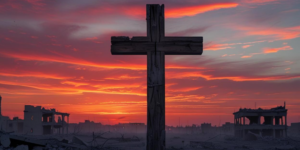Former Prisoners of Iran Now Voice of Hope
“And do not fear those who kill the body but cannot kill the soul. Rather fear him who can destroy both soul and body in hell” (Matt. 10:28, ESV).
When Marziyeh Amirizadeh showed up at the local police station in Tehran on March 5, 2009, authorities told her there was an issue with her car registration.
In reality, she was walking into a trap.
Iranian government officials had been spying on her and her friend, Maryam Rostampour, and they didn’t like what they saw.
Within hours, both of the young women were arrested.
Their charges: anti-government activity, apostasy and promoting Christianity within the Islamic Republic of Iran.
Their crimes: handing out Bibles and sharing their faith through two home churches—one for their friends and acquaintances, and one that reached out to prostitutes.
Authorities ransacked Maryam and Marziyeh’s apartment without a warrant, confiscated anything related to Christianity, threw them into jail and denied them access to a lawyer for months.
“I remember one day they sent us to a dark and dirty cell in a basement,” Maryam says.
The two women were interrogated for hours, as their captors demanded names and addresses of every Christian they knew.
“Otherwise, we will beat you until you vomit blood,” Maryam recalls them saying of the threat of punishment that became a gruesome reality for so many of her fellow prisoners.
The women refused to identify their Christian friends. They were left in the dark, not knowing if the next interrogation would lead to beatings or torture.
“For days, we did not have anything to eat or drink,” Maryam says. “We could only use wet blankets strongly smelling of urine to keep ourselves warm.”
As they huddled together, terrified, all they could do was wait and pray.
Encountering Jesus
“Then I saw heaven opened, and behold, a white horse! The one sitting on it is called Faithful and True, and in righteousness he judges and makes war” (Rev. 19:11).
Born into Muslim families in a country that forces Islam on its people, it’s a miracle Maryam and Marziyeh ever discovered the truth about Jesus—a man who is just another prophet in the eyes of Islamic believers.
They grew up in separate cities, but both women sensed at a young age that something was missing from their lives. They were thirsty for a relationship with God, but they couldn’t seem to quench their thirst, even when they prayed to Allah five times a day and faithfully read the Quran.
Then, in their teenage years, each woman had an encounter with Jesus.
For Marziyeh, it started with a dream about a white horse. She wrote about it in the book Captive in Iran:
“The horse ran like the wind to save me. As I held fast to its neck, I felt its love pouring into me with a power and a purity I had never known. … For a week after that, all I could think about was the deep love I had experienced in the dream. I have never since experienced love like that in this world.”
Not long after she had that unforgettable dream, Marziyeh was invited to a church, where she learned about Jesus and experienced His healing power. After years of seeking, the Lord had revealed Himself to her. She was convinced Jesus was the Son of God.
Maryam discovered Jesus when a Muslim friend who knew she was seeking answers gave her a Christian booklet.
“She told me, ‘Don’t read the last page of the booklet, because it’s a conversion prayer,’” Maryam recalls. “From the first page I could feel my heart was deeply moved.”
As Maryam prayed the prayer on the last page and accepted Christ, she couldn’t shake the feeling that she had known about Jesus all along; she just hadn’t been able to get her hands on a Bible to learn His name.
Prison Becomes Church
“I want you to know, brothers, that what has happened to me has really served to advance the gospel, so that it has become known throughout the whole imperial guard and to all the rest that my imprisonment is for Christ. And most of the brothers, having become confident in the Lord by my imprisonment, are much more bold to speak the word without fear” (Phil. 1:12-14).
Maryam and Marziyeh spent two weeks in jail before they were transferred to Evin Prison, a notorious Iranian penitentiary known for torture, rape and executions.
At Evin, the women experienced daylong interrogations, solitary confinement and the pain of numerous infections left untreated by the staff at the medical clinic.
Their hearts broke as they watched 2- and 3-year-old children abused inside the prison—the place where they were born and spent their formative years.
But in the midst of the heartache, something miraculous happened.
The women locked up with them—many of whom had initially shunned Marziyeh and Maryam, calling them “dirty Christians” and apostates—began to see something different about them.
Maryam and Marziyeh refused to hide or deny their faith in Christ. They responded to insults and curses with love, compassion and forgiveness. And they were always asking their fellow inmates—prostitutes, murderers and political prisoners—how they could pray for them.
“They couldn’t understand that God still loved them,” Marziyeh says. “They’d cry and confess their sins. They could see miracles through our prayers.”
Maryam and Marziyeh were no longer the “dirty Christians.” Their fellow prisoners—and even some guards—sought them out, wanting to know about this Jesus they loved more than life itself.
“Evin Prison, the dreaded hellhole of Tehran and symbol of radical Islamic oppression, had become our church,” Maryam writes. “And so we prayed on.”
‘It’s Not About Us’
“Go therefore and make disciples of all nations, baptizing them in the name of the Father and of the Son and of the Holy Spirit, teaching them to observe all that I have commanded you. And behold, I am with you always, to the end of the age” (Matt. 28:19-20).
The maximum punishment for apostasy in Iran is execution. Time and again, Iranian officials told Maryam and Marziyeh they could live and go free if they would just renounce their Christian faith. The women wouldn’t even consider it.
They spent almost nine months in Evin Prison. Before they were locked up, they delivered Bibles—20,000 of them in three years—secretly, under the cover of darkness.
At Evin, they shared their faith freely. Women came to them, hungry for truth and desperate for God’s love. Many found that truth and love in Jesus, inviting Him into their lives right there in their prison cells.
“We started to trust His plan,” Maryam says. “We believe it’s not about us. It’s about God.”
They still don’t know exactly how they won their freedom after countless promises of execution. They know it was ultimately an act of God, and that the prayers and pressure from Christians and human rights activists around the world helped convince their captors to let them go.
Now both women live in the United States, outside Atlanta. Knowing that returning to Iran would mean certain death, Maryam and Marziyeh use their book and their voices to spread the word about what happened to them—and what’s still happening to countless Christians and other prisoners locked away in Iran.
“We promised those women in prison to be a voice for them and to share their stories with the world,” Maryam says.
Their story has inspired the church around the globe, especially in the United States, where the freedom to follow Christ is too often taken for granted.
Maryam and Marziyeh pray Americans will cherish their ability to worship Jesus openly and that they’ll remember to share the gospel through their lives, no matter where the Lord takes them.
“Our view about church changed,” Marziyeh says. “Even a dark and brutal prison like Evin can be a church.”
To learn more about Maryam and Marziyeh’s book, Captive in Iran, and to learn how to help Christians who are being persecuted for their faith, click here.
This article originally appeared on BillyGraham.org.







































